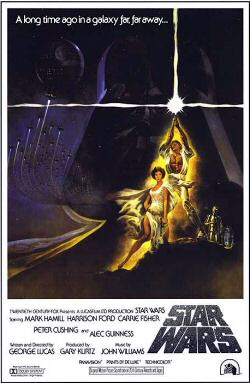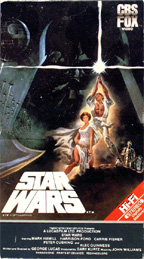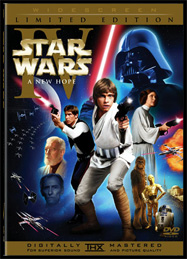
Today there is only one first run movie theatre chain in the whole of Canada, so even the most successful movies only play for a matter of weeks.
But back in the 1970’s there was still competition among Canadian movie theatres so Star Wars actually played on Canadian movie screens for over a year. When the first Star Wars movie was released I was so caught up in it that I ended up going out to see it in a variety of movie theatres thirteen times during that first year.
I am a huge Star Wars fan.
I bought all the Star Wars merchandise that I could afford. In those days there were no DVDs or downloads. VCRs had just come on the market and they were prohibitively expensive.
So at first those of us who were not indescribably wealthy had to content ourselves with purchasing vinyl record albums that ran at 33 1/3rd rpm on an old fashioned machine called a record player. I bought the music in the form of the John Williams Star Wars soundtrack album, as well as a record called “The Story of Star Wars”, a synopsis of the story narrated by C3PO with audio clips from the film. To this day any time I hear the 20th Century Fox music tag I flash on the “real” Star Wars opening.
And today the George Lucas’s Star Wars empire continues to make money in new ways. I don’t have a problem with that. It is a business after all.
I still love Star Wars, particularly the first one. And this article in no way intends any disrespect. I’m telling you about my connection with Star Wars because the incredible success that Star Wars had makes it a good example. That, and because Star Wars was the very first videotape movie I saw played on a VCR in a private home.
What I really want to do today (besides procrastinate from working on my NaNoWriMo novel) is to look at personal use copying as a copyright infringement issue.
 The Copyright Lobby makes no distinction between commercial bootleggers who distribute illegal copies for profit and legal purchasers who seek to make a back-up copy or digital format shift for personal use. Because they insist it is all the same thing, the Copyright Lobby has been pressuring governments the world over in an attempt to criminalize personal use copying.
The Copyright Lobby makes no distinction between commercial bootleggers who distribute illegal copies for profit and legal purchasers who seek to make a back-up copy or digital format shift for personal use. Because they insist it is all the same thing, the Copyright Lobby has been pressuring governments the world over in an attempt to criminalize personal use copying.
I think there is a problem with the terminology here because calling both things by the same name is horribly misleading. Both activities involve digital copying, but that is where the similarity ends. Just as apples and oranges are both fruit but they are really not the same at all.
apples and oranges
 One thing the Copyright Lobby calls “piracy” would be more accurately called “Bootlegging”. Bootleg music recordings have been around as long as audio recording technology has existed. People have smuggled recording devices into concerts and made copies which they have then sold around the world. There have also been professional bootleggers who have copied recorded music and repackaged it to sell illegally. These activities have resulted in lost revenue for music distributors, and in fact should be illegal.
One thing the Copyright Lobby calls “piracy” would be more accurately called “Bootlegging”. Bootleg music recordings have been around as long as audio recording technology has existed. People have smuggled recording devices into concerts and made copies which they have then sold around the world. There have also been professional bootleggers who have copied recorded music and repackaged it to sell illegally. These activities have resulted in lost revenue for music distributors, and in fact should be illegal.
 The other thing the Copyright Lobby calls “piracy” is what I call “Personal use copying”. This covers a much wider range of activities, but the chief defining factor of personal use copying is the fact that this digital copying is not for profit. Rather than resulting in lost revenue for distributors, personal use copying relieves the burden of format shifting from the manufacturer to the consumer. When shared through p2p networks personal use copying serves as a means of promoting these commercial products in the same way that radio and television broadcasts have done under the traditional business model. This type of copying should be legal.
The other thing the Copyright Lobby calls “piracy” is what I call “Personal use copying”. This covers a much wider range of activities, but the chief defining factor of personal use copying is the fact that this digital copying is not for profit. Rather than resulting in lost revenue for distributors, personal use copying relieves the burden of format shifting from the manufacturer to the consumer. When shared through p2p networks personal use copying serves as a means of promoting these commercial products in the same way that radio and television broadcasts have done under the traditional business model. This type of copying should be legal.
The Copyright Lobby’s effort to criminalize this type of copying simply alienates the customer base. Like DRM or SOC methods, it does absolutely nothing to stem the flow of bootlegging.
When did the idea of ownership change?
It used to be that when you bought something you owned it. You were free to do with it what you liked. Even if it was something covered under copyright law… like a book, you were entitled to read that book as many times as you wanted to.
- You could loan it to a friend.
- You could quote from it in an essay
- You could read it aloud to your blind grandmother.
And at the end of the day it was still your book. Unless you decided you no longer wanted it, at which time you could legally sell it to a used book store.
Now lets look at what’s been happening so far in the information age. Manufacturers of recorded music and movies have their materials covered under copyright. They want us to not make copies for our own personal use, even though we have paid them the price they ask.
Personal use copying is not the same thing as bootlegging for commercial gain.
The Problem

If you purchased Star Wars in the Sony Betamax version back then, you would have found yourself out of luck a few short years later when Sony stopped making Betamax VCRs. When your Betamax machine became inoperable, you could no longer buy a new one, which of course rendered the tape you purchased in good faith unplayable. No one warned the unfortunate consumers that invested in Betamax tapes and Betamax equipment. I never heard of anyone getting refunds from the movie companies. Or the MPAA. Or Sony. Etc.

But.
Now you can’t. So what do you do if you really loved Star Wars?
You go out and buy it again. This time on VHS.
The rest of your life, eh? I know that’s what I thought. Didn’t you?
Did Twentieth Century Fox ever offer to reimburse you for the useless hunk of plastic and tape (that you have now purchased twice for your own use) that is now deteriorating? And suddenly it’s near impossible to buy a new VHS machine because there is yet another new technology– now movies are on DVD. Even if you can find a new VHS machine, we’ve all learned that a VCR will be lucky to last for five years anyway. And of course the VCRs you can find now are far more expensive than DVD players. So what’s a fan to do. Oh right.
You go out and buy Star Wars again on DVD.

[Of course, this particular example is extra irritating because George Lucas hasn’t stopped tinkering with the thing, and since he’s vowed to never release the REAL version (the one that actually played in theatres in 1977) on DVD, so I will never have the version I want no matter how many times I’ve paid for it. *sigh*]
But you’re a fan.
So you go out and buy the movie AGAIN on DVD.
At least you have it in a form that will last.

Or not.
Because then along came HD DVD. The media manufacturers were a little surprised that we didn’t all rush out and buy HD machines.
Replacing our entire video library. AGAIN.
Oh… you were one of those suckers who got conned into converting to bought into HD? Ooooops! Didn’t anyone tell you that the technology you were supposed to back was Blu-Ray?
I could go through the same process to look at the parallels in the music industry: piano rolls, gramophone cylinders, ’78’s, LPs, 8 track tapes, cassette tapes and CDS… all over the course of a single century.
Funny, I have a working gramophone older than I am which will play ’78’s. Yet our modern day electronic equipment will be doing well to work after a decade.
I don’t know about you but I am tired of buying the same movies over and over again.
Copyright is an agreement between the creator/manufacturer and the consumer.
The media distributors have NOT kept their part of the bargain, expecting consumers to pay for the same material over and over again. It should be legal to be able to watch the movie you have purchased in good faith as many times as we want to, for the rest of our lives.
Consumers have not been given any protection by governments the world over.
At the very minimum customers need to be given the right to copy the products they have purchased onto the piece of technology needed to play it.
We believe we own what we have purchased.
They want us to believe that we don’t.
Fortunately our government representatives are in an excellent position to look out for the Canadian consumer interests as they redraft our copyright law for the benefit of Canadians.
[At last: my copycon submission made it to the copyright consultation website.]

